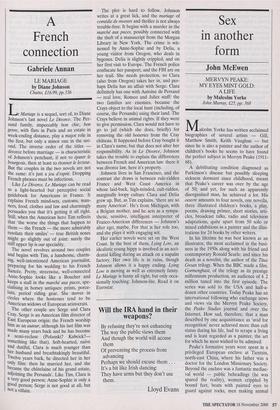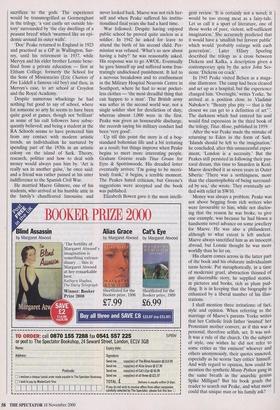Sex in another form
John McEwen
MERVYN PEAKE: MY EYES MINT GOLD: A LIH by Malcolm Yorke John Murray, £25, pp. 368 Malcolm Yorke has written acclaimed biographies of several artists — Gill, Matthew Smith, Keith Vaughan — but since he is also a painter and the author of children's books he seems to have found the perfect subject in Mervyn Peake (1911- 68).
A debilitating condition diagnosed as Parkinson's disease but possibly sleeping sickness dormant since childhood, meant that Peake's career was over by the age of 50; and yet, for such an apparently disorganised man, he achieved a lot. His oeuvre amounts to four novels, one novella, three illustrated children's books, a play, poems, drawing primer, short stories, arti- cles, broadcast talks, radio and television adaptations, quite apart from 50 solo or mixed exhibitions as a painter and the illus- trations for 24 books by other writers.
In his lifetime he was best known as an illustrator, the most acclaimed in the busi- ness in the 1950s along with his friend and contemporary Ronald Searle; and since his death as a novelist, the author of the Titus Groan trilogy. When the BBC made a film, Gormenghast, of the trilogy as its prestige millennium production, an audience of 4. 2 million tuned into the first episode. The series was sold to the USA and half-a- dozen other countries. Today Peake has an international following who exchange news and views via the Mervyn Peake Society, the Peake Studies journal and over the Internet. How sad, therefore, that a man described by one acquaintance as 'avid for recognition' never achieved more than cult status during his life, had to scrape a living and is least regarded as a painter, the art for which he most wished to be admired.
Peake's formative years were spent in a privileged European enclave at Tientsin, north-east China, where his father was a doctor for the London Missionary Society. Beyond the enclave was a fantastic mediae- val world — public beheadings (he was spared the reality), women crippled by bound feet, boats with painted eyes to guard against rocks, men making animal sacrifices to the gods. The experience would be transmogrified as Gormenghast in the trilogy, 'a vast castle set outside his- tory' surrounded by 'the clay dwellings of a peasant breed' which 'swarmed like an epi- demic around its outer walls'.
`Doc' Peake returned to England in 1923 and practised as a GP in Wallington, Sur- rey, until his retirement in 1937, while Mervyn and his elder brother Lonnie bene- fited from a private education — first at Eltham College, formerly the School for the Sons of Missionaries (Eric Chariots of Fire Liddell a famous old boy) and then, in Mervyn's case, to art school at Croydon and the Royal Academy.
Despite numerous whackings he had nothing but good to say of school, where for someone so arty he seems to have been quite good at games, though not 'brilliant' as some of his cult followers have subse- quently believed; and being a student at the RA Schools seems to have protected him from any contact with modern artistic trends, an individualism he nurtured by spending part of the 1930s in an artistic colony on the island of Sark. Theory, research, politics and how to deal with money would always pass him by. 'Art is really sex in another guise,' he once said; and a friend was rather pained at his utter indifference to the Spanish Civil War.
He married Maeve Gilmore, one of his students, who arrived at his humble attic in the family's chauffeured limousine and never looked back. Maeve was not rich her- self and when Peake suffered his institu- tionalised final years she had a hard time.
War followed. Despite having enjoyed public school he proved quite useless as a soldier. In 1942 he asked for leave to attend the birth of his second child. Per- mission was refused. 'What's so new about having a baby?' he was reasonably asked. His response was to go AWOL. Eventually he gave himself up and suffered some frus- tratingly undisclosed punishment. It led to a nervous breakdown and to confinement in the Military Hospital Neurosis Centre in Southport, where he had to wear pocket- less clothes — 'the most dreadful thing that can happen to a man'. The British army was softer in the second world war, not a single soldier shot for dereliction of duty, whereas almost 1,000 were in the first. Peake was given an honourable discharge, the records saying his military conduct had been 'very good'.
Up till this point the story is of a bog- standard bohemian life and a bit irritating as a result; but things improve when Peake begins to meet more interesting people. Graham Greene reads Titus Groan for Eyre & Spottiswoode. His dreaded letter eventually arrives: 'I'm going to be merci- lessly frank,' it begins, a terrible moment. The Peakes hated criticism, but Greene's suggestions were accepted and the book was published.
Elizabeth Bowen gave it the most intelli- gent review. 'It is certainly not a novel; it would be too strong meat as a fairy-tale. Let us call it a sport of literature, one of those works of pure, violent, self-sufficient imagination.' She accurately predicted that it would have a 'smallish but fervent public' which would 'probably enlarge with each generation'. Later Hilary Spurling described the trilogy as a cross between Dickens and Kafka, a description given a contemporary spin by the actor John Ses- sions: 'Dickens on crack'.
In 1945 Peake visited Belsen as a maga- zine illustrator. The camp had been cleared and set up as a hospital, but the experience changed him. 'Overnight,' writes Yorke, 'he arrived at a position close to Vladimir Nabokov's: "Beauty plus pity — that is the closest we can get to a definition of art" '. The darkness which had entered his soul would find expression in the third book of the trilogy, Titus Alone, published in 1959.
After the war Peake made the mistake of returning to Eden in the form of Sark. `Islands should be left to the imagination,' he concluded, after this unsuccessful exper- iment, 'London is a necessity.' But the Peakes still persisted in following their pas- toral dream, this time to Smarden in Kent. Maeve described it as seven years in Outer Siberia: 'There was a nothingness, more than the claustrophobia of being surround- ed by sea,' she wrote. They eventually set- tled with relief in SW10.
Money was always a problem. Peake was not above begging from rich writers who were favourable to him, while not disclos- ing that the reason he was broke, to give one example, was because he had blown a handsome novel advance on some jewellery for Maeve. He was also a philanderer, although to what extent is left unclear. Maeve always sanctified him as an innocent abroad, but Lonnie thought he was more worldly than he let on.
His charm comes across in the latter part of the book and his obdurate individualism turns heroic. Put metaphorically, in a time of modernist gruel, abstraction thinned of any discernible story, he supplied stories, in pictures and books, rich as plum pud- ding. It is in keeping that the biography is enhanced by a liberal number of his illus- trations.
I shall mention three irritations: of fact, style and opinion. When referring to the marriage of Maeve's parents Yorke writes that her Catholic Irish father 'insisted' her Protestant mother convert, as if this was a personal, therefore selfish, act. It was not. It was a rule of the church. On the subject of style, one wishes he did not refer to some critics as 'the eminent' whoever and others anonymously, their quotes unnoted, especially as he scorns 'lazy critics' himself. And with regard to opinion, how could he mention the synthetic Monty Python gang in the same breath as the anarchic genius Spike Milligan? But his book goads the reader to search out Peake, and what more could that unique man or his family ask?



































































































 Previous page
Previous page